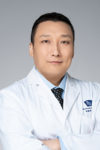 Digestive Disease Center
Digestive Disease Center
The Beijing United Family Digestive Disease Center is committed to providing patients with comprehensive gastrointestinal, hepatobiliary, and pancreatic disease diagnosis and treatment services. Our team is very experienced in, and skilled at, the diagnosis and treatment of all manner of gastrointestinal and liver diseases, especially chronic and refractory ones. We also use this experience and skill to carry out painless gastrointestinal endoscope technology under anesthesia. When it comes to gastrointestinal diseases, especially cancers, the Beijing United Family Hospital Digestive Disease Center is at the forefront of the field, and the department works closely with endoscopic, cancer, and laparoscopic experts for diagnosis and treatment. For difficult cases, our multidisciplinary team uses a patient-centered approach that integrates the best expert sources. This provides the patients with comprehensive consultation and assessment resources and personalized treatment programs, so that the patients can get the best medical care and the most effective and scientific medical assistance.
Disease Center provides all standard outpatient consultation services as well as emergency care. Our treatment and diagnostic services include but are not limited to the following diseases:
- Peptic ulcers
- Gastrointestinal bleeding
- Tumours of the digestive tract
- Gastric tumors
- Colonic and rectal tumors
- Hepato-bilio-pancreatic tumors
- Gastritis
- Gastroesophageal reflux disease
- Inflammatory bowel disease
- Crohn’s disease
- ulcerative colitis
- Celiac disease
- Gastric polyps, colonic polyps
- Constipation, diarrhea
- Pancreatitis
Chronic liver disease, viral hepatitis
- Autoimmune hepatitis
- Fatty liver disease
- Drug-induced liver disease and toxic hepatopathy
- Cirrhosis
The services we offer include, but are not limited to, the following diagnoses and treatments:
Digestive system check:
- Painless gastroscopy, painless enteroscopy, painless colonoscopy
- Gastrointestinal endoscopy biopsy
- Liver biopsy
- Helicobacter pylori (C13) test
Endoscopic treatment (EMR):
- Endoscopic retrograde cholangiopancreatography
- Endoscopic ultrasonography
- Endoscopic gastric and colonic polyp resection
- Early gastric and colon cancer endoscopic submucosal dissection
Our minimally invasive surgical treatments include:
- Surgery using the robotic da Vinci Surgical System
- Laparoscopic surgery
- Chemotherapy for gastrointestinal cancer
- Radiotherapy for gastrointestinal cancer (Novalis Tx™ radiosurgery system)
OUR CLINICIANS


Wen LI
Chair of Gastroenterology at BJM and SZU


Qiusheng WANG
Chief Physician(Consultant Surgeon) Distinguished Professor of Surgery in the Minimally Invasive Digestive Disease Center


Jianyu HAO
Gastroenterologist Chief Physician


Wei GENG
Gastroenterologist Hepatologist Chief Physician


Lin ZHANG
Section Chief of Integrative Medicine Chief Physician


Li ZHAO
Gastroenterologist Chief Physician


Leona LI
Gastroenterologist


Zantao WANG
Gastroenterologist、Endoscopist、Chief Physician


Jing YANG
Gastroenterologist Endoscopist Associate Chief Physician
(中文) 诊疗范围
(中文) 特色诊疗
(中文) 为什么选择我们:
Copyright United Family Healthcare 2014 All right reserved - 京卫网审[2014]第1927号 - 京ICP备13017554号-4




